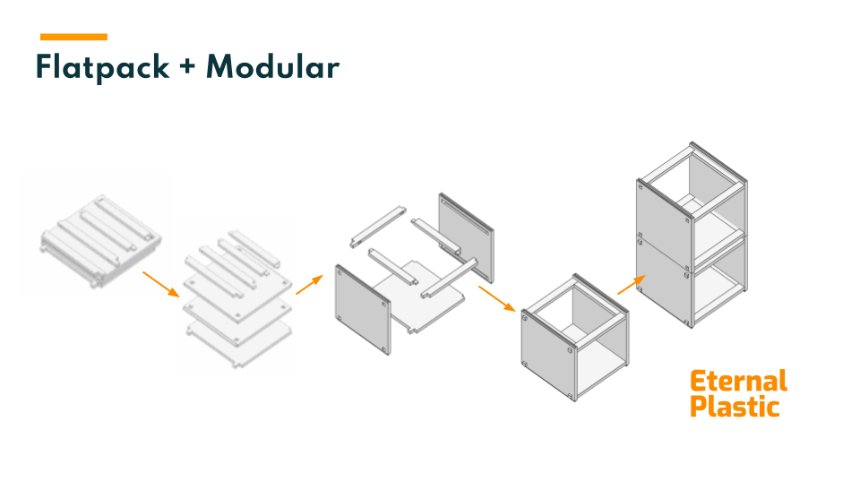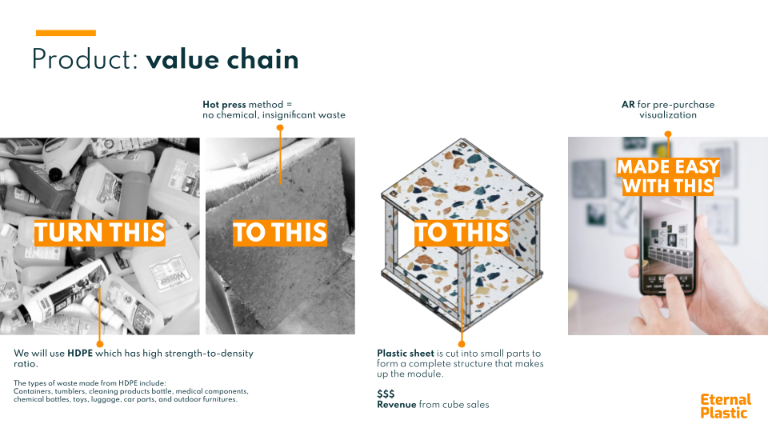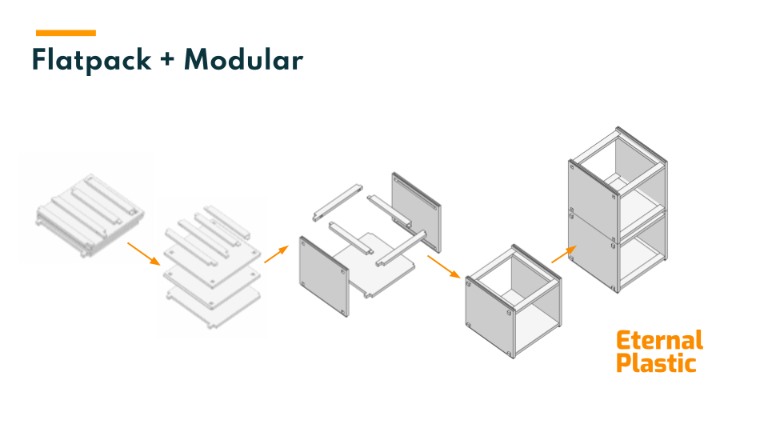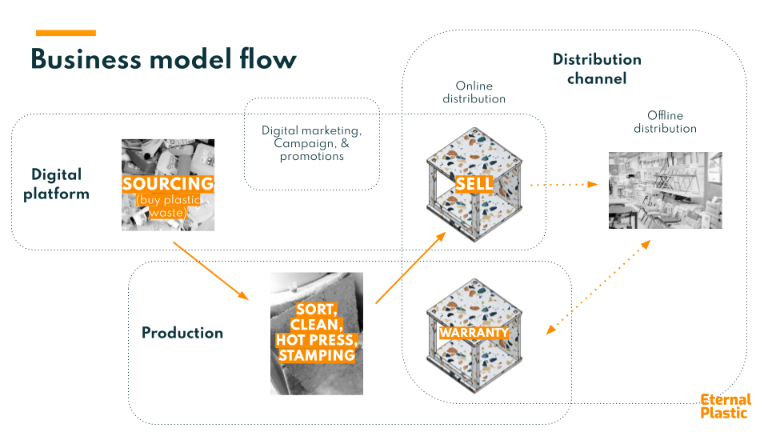Eternal Plastic
We upcycle plastic waste into affordable and durable plastic furniture. We reduce the selling price through a platform where everyone can sell their waste directly to us, thus we can streamline the supply chain.

1) The imperishable matter called plastic
Plastic is one of the most important inventions of the 20th century. Popularized since 1930, no plastics have biodegraded since its discovery. Indonesia has also been severely affected by plastic waste, in 2018 there are 3.2 billion tons of plastic waste ending up in the ocean, and only 10% of plastics is recycled.
We could see that people’s awareness in separating plastic waste is low. On the other hand, we found that existing furniture is still difficult to assemble, cannot be dismantled and reassembled once installed, and cannot grow with our needs. This results in over consumption of low quality plastic furniture. The pandemic also has spurred household waste production. On average, online transactions have increased twice. Plastic waste continues to grow with 96% of online shopping packages wrapped in plastics.
2) What if we could cut down plastic waste, while reducing consumerism, and still making profits?
While raising awareness in households to separate plastics waste, we make profits through a circular economy system. We take raw materials from household plastic waste, then we design the Eternal Plastic to last long, and grow with customer's needs: it can be disassembled and assembled again. We reduce the selling price through a platform where everyone can sell their waste directly to us, thus we can streamline the supply chain.

Circular economy
- Collect household plastic waste directly from households and community waste banks
- Minimal chemical treatment, no hazardous coloring, almost zero production waste
- Lean supply chain through digital platform enabling individuals to sell their plastic waste directly to us.
A furniture that lasts multiple generation
- Grows with you with its modularities to suit your current needs
- Robust design, will survive several moves
- Solid structure with timeless design
Accessible for everyone
- Flatpack means low shipping cost and warehousing cost
- Easy assembly through Lego-like modular design
- Versatile module design, wide range of application from small dorm room to cafes to offices.
- Easy fitting with AR simulation features
3) The flat-pack, modular furniture that will lasts multiple generation
We use a flat-pack system that enables us to reduce warehousing and logistics costs. Unlike other flatpacks which are designed to be disposable, Eternal Plastic is designed to be disassembled and then reassembled. Users can move houses, dismantle them into flat-packs, carry them easily, then assemble them back in their new homes. The modularity allows it to be configured into various types of furniture, such as TV tables, storage boxes, bedside tables, and many more by combining modules and rotating the box to a desired function.

For this initial collection, we choose a cube-shaped furniture because the cube shape is the most versatile shape. The natural recycle process also produces a unique pattern, making each cube personal. The joint system is also designed to be assembled easily, as easy as stacking Lego. We also create a shopping experience that is unique for our customer. Customers could make their own furniture, giving them a sense of belonging and involved in the process because they could collect their own plastic waste and then rebuild it as new furniture.

4) Supply Chain Digitization
In one platform, we source plastic waste directly from the household while also selling our products. This model makes us highly scalable. The more people sell their plastic waste, the less waste there is in the landfill and burned, the more raw materials we have, the more furniture we can sell. With this scalability, we can generate revenue since day 1 and drive exponential growth.
For the customer's side, we help visualize the furniture in the desired space, customers could use the AR feature from the app. This way, customers could decide how many modules they should buy to meet their needs. Excessive consumption has been avoided.
App features:
SELL plastic waste
- Input & choose waste type, condition, and delivery method.
- User can choose to sell directly (get money) or collecting their waste to build their own furniture (get Eternal cube)
BUY Eternal Plastic cube module
- Buy directly
- AR visualization to simulate product placement at user’s space
App prototype demo video: https://youtu.be/oD1iU4hJsSs
5) Business Model

Our target market are young people and small families living in a small house or apartment, are looking for more responsible furniture or dispose of their plastic trash, and this group will be our main targeted customer.
One of the existing companies in recycled plastic furniture is Robries. They made furniture and accessories with recycled plastic as an aesthetic element, selling them to niche markets. We also use 100% recycled plastic but we sell it to the mass market. We can target the mass market because we can achieve low COGS with a lean supply chain through a digital platform to crowdsource plastic waste. On our platform we can also save plastic waste and trade it in the future with our products. This option will also raise households awareness in separating plastic trash from the roots.
The Indonesian furniture market has a projected revenue of 4.5 billion US dollars per year, but with an average revenue per user of only 200 US dollars per year. From this we can see that the furniture market is very large, but the spending ability is low. So Eternal’s position is in the affordable mass market segment. We aim to create affordable modular furniture that is made from recycled plastic waste that is easy to assemble by everyone.
At the beginning we will sell through the online channel with a supply chain app that accommodates the purchase of plastic waste directly from users. Then we will continue to improve efficiency in our supply chain until the production line is more solid, so that it is ready to export through regional e-commerce.
6) Founding Team

We’re founded by 3 people with various specialties. The CEO is an architect whose work focuses on sustainability. The CTO is a full stack Informatics Engineering graduate specializing in AR and a plastic expert in the team: run his own 3D printing house and participate in several pandemic-related d.i.y. plastic initiatives in his city. CPO is a retired-designer with 2 industrial design IP rights, experienced from designing public furniture to building startups. We share the same concerns on the issue of plastic waste, with expertise that complement each other. The CEO and CPO are a married couple.
It was all started earlier in March 2021, we saw the announcement of a green tech themed hackathon. We decided to participate in realizing the trash furniture idea that we had been thinking about. Later, the CPO invited his cousin who has a tech background, who also has a 3D printing house business. Unexpectedly, we passed the preliminary round to the top 5 https://dailysocial.id/post/ukode-hackathon-resmi-pilih-5-finalis-dengan-inovasi-terbaik-untuk-perubahan-iklim. As a result, we are motivated to really build this startup.
7) Call to Action
We open opportunities to collaborate with waste banks to become our suppliers, NGOs to develop programs and campaigns with us, furniture retailers to become our distribution channels, and pre-seed investors to be able to accelerate us.
Meet the solution owner
